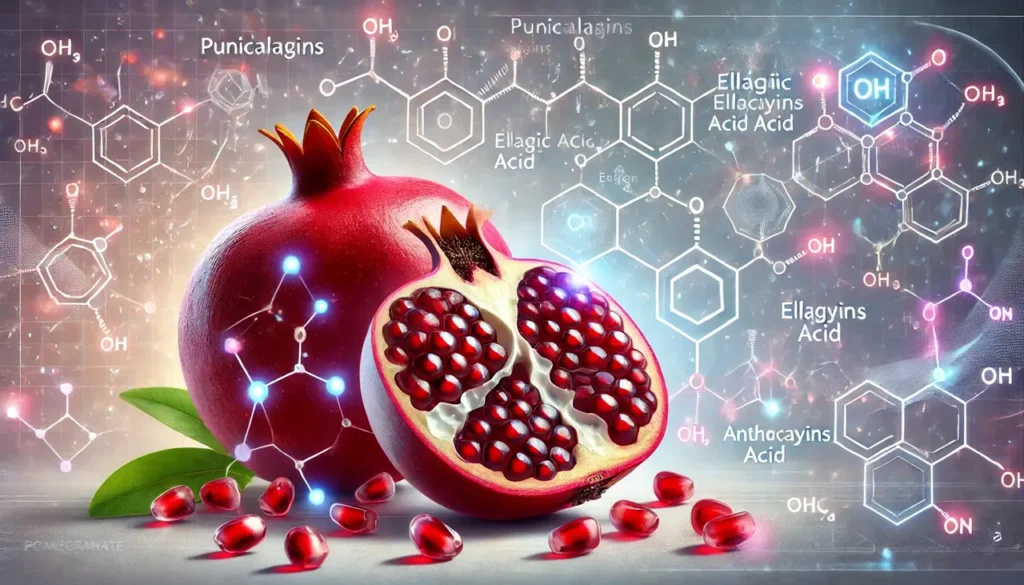Pomegranate (Punica granatum) is a nutrient-dense fruit celebrated for its rich history in traditional medicine and culinary applications. With its unique flavor profile and numerous health benefits, pomegranate has recently gained attention as a potential nootropic supplement. Nootropics, often referred to as “smart drugs,” are substances that may enhance cognitive functions such as memory, creativity, and motivation. This article explores the chemistry of pomegranate, its physiological mechanisms, potential nootropic benefits, appropriate dosing, possible side effects, interactions with other supplements and medications, and essential considerations for safe supplementation.
Pumpkin: Potential Nootropic Benefits, Dosage, Side Effects, Interactions, and Other Important Information About This Supplement
Castor Bean: Benefits, Dosage, Side Effects, Drug Interactions, and Other Important Information
Sources of Pomegranate
Pomegranates are native to the Mediterranean region, the Middle East, and parts of India. They thrive in warm climates and are cultivated extensively in countries like Iran, India, and the United States, particularly California. The fruit is typically characterized by its leathery skin, which ranges in color from red to pink or white, and contains hundreds of edible seeds, known as arils, surrounded by juicy, tart pulp. Pomegranates are commonly consumed fresh, juiced, or as an extract, with the juice and extract form being the most prevalent in dietary supplements.
Key sources of pomegranate include:
- Whole fruit: Consumed fresh, pomegranate seeds can be added to salads, yogurt, or smoothies.
- Juice: Pomegranate juice is a popular beverage, often praised for its antioxidant properties.
- Extract: Pomegranate extract is available in capsule or powder form and is often standardized for its active compounds.
While fresh pomegranates can be enjoyed in various culinary applications, pomegranate extract provides a concentrated dose of beneficial compounds, making it a preferred choice for supplementation.
Age Gracefully with Anti-Aging Power and Brain Support from Pomegranate—Available on Amazon!

Chemistry of Pomegranate
Pomegranates are rich in bioactive compounds, particularly polyphenols, flavonoids, and ellagitannins. The primary active ingredients include:
- Punicalagins: These ellagitannins are potent antioxidants, exhibiting strong free radical scavenging properties.
- Ellagic acid: Derived from the breakdown of punicalagins, ellagic acid also possesses antioxidant and anti-inflammatory properties.
- Anthocyanins: These pigments are responsible for the deep red color of pomegranate juice and contribute to its health benefits.
- Vitamin C: An essential nutrient that supports immune function and acts as an antioxidant.
The antioxidant capacity of pomegranate is remarkable, with studies suggesting that its antioxidant activity can be even greater than that of red wine or green tea. The rich polyphenolic profile of pomegranate contributes significantly to its neuroprotective effects and potential cognitive benefits.

Physiological Mechanisms of Pomegranate in the Body and Brain
Pomegranate exerts its effects on the body and brain through several physiological mechanisms. The primary modes of action include:
Antioxidant Activity
The potent antioxidant properties of pomegranate, primarily due to punicalagins and anthocyanins, help neutralize reactive oxygen species (ROS) and reduce oxidative stress. Oxidative stress is a critical factor in cognitive decline and neurodegenerative diseases, as it can lead to neuronal damage. By scavenging free radicals and reducing oxidative damage, pomegranate may help protect brain cells and enhance overall cognitive function.
Anti-Inflammatory Effects
Chronic inflammation is implicated in various neurodegenerative conditions. Pomegranate has been shown to inhibit inflammatory pathways and reduce the expression of pro-inflammatory cytokines. By mitigating neuroinflammation, pomegranate could create a healthier environment for neuronal health, potentially enhancing cognitive processes and overall mental clarity.
Neuroprotective Effects
Research indicates that pomegranate extracts can stimulate neurogenesis—the formation of new neurons—in the hippocampus, a brain region essential for learning and memory. This process may contribute to improved memory and cognitive performance, especially in aging populations.
Enhancement of Blood Flow
Pomegranate juice has been associated with improved endothelial function and increased nitric oxide production, leading to enhanced blood flow. Improved circulation to the brain can provide essential nutrients and oxygen, supporting cognitive performance and mental agility.

Nootropic Benefits of Pomegranate
The potential nootropic benefits of pomegranate stem from its rich composition of bioactive compounds and their physiological effects on the brain. These benefits include:
- Enhanced Cognitive Performance: Pomegranate’s antioxidant and anti-inflammatory properties may improve cognitive performance by stabilizing neuronal function and protecting against oxidative stress. Enhanced blood flow to the brain, along with reduced inflammation, could lead to improved focus, memory, and overall cognitive abilities, especially in individuals facing cognitive challenges. This enhanced circulation also ensures that vital nutrients and oxygen reach brain cells, promoting optimal functioning. Furthermore, the synergistic effects of pomegranate with other cognitive-enhancing foods may help create a more robust support system for brain health.
- Protection Against Cognitive Decline: The neuroprotective properties of pomegranate may offer a safeguard against age-related cognitive decline and neurodegenerative diseases such as Alzheimer’s and Parkinson’s. Its ability to reduce oxidative stress and inflammation is crucial in preventing the neuronal damage associated with these conditions. Additionally, the regular intake of pomegranate may help preserve synaptic integrity, which is essential for maintaining cognitive function over time. This protective effect can be particularly beneficial for aging populations looking to sustain their mental sharpness and overall quality of life.
- Mood Enhancement: There is emerging evidence that the antioxidant properties of pomegranate may positively influence mood by modulating neurotransmitter levels and reducing neuroinflammation. A healthy balance of neurotransmitters is vital for emotional regulation and cognitive function. Moreover, by lowering inflammation in the brain, pomegranate may help alleviate symptoms of anxiety and depression, providing a natural means of mood support. This combination of effects could lead to enhanced resilience to stress and improved overall emotional well-being, making pomegranate a valuable addition to a mental health regimen.
- Support for Brain Health: Pomegranate is known to help promote overall brain health by protecting against oxidative damage and supporting neurogenesis. Its regular consumption may contribute to improved cognitive longevity, making it a valuable addition to a brain-healthy diet. The bioactive compounds found in pomegranate may also enhance synaptic plasticity, which is crucial for learning and memory formation. By fostering a brain-friendly environment, pomegranate can play a significant role in optimizing cognitive performance and maintaining mental acuity throughout life.
- Improved Memory and Learning: Preliminary studies suggest that pomegranate supplementation may enhance memory retention and learning capabilities, particularly in older adults. The fruit’s ability to promote neurogenesis and reduce oxidative damage could be key factors in this effect. Additionally, by supporting the health of hippocampal neurons, pomegranate may facilitate better information processing and retention. This cognitive boost can empower individuals to engage more fully in learning experiences and effectively retain new knowledge.

Dosage and Supplementation Guidelines
For individuals considering pomegranate as a nootropic supplement, understanding the appropriate dosing guidelines is essential for maximizing benefits while minimizing risks. While there is no established recommended daily allowance (RDA) for pomegranate, research provides insights into effective dosages.
- General Nootropic Dosage: For cognitive enhancement, doses ranging from 500 mg to 1000 mg of pomegranate extract per day are commonly used in studies. This dosage is typically standardized to contain at least 30% punicalagins or 20% ellagitannins to ensure optimal potency.
- Juice Consumption: Drinking 8 ounces (approximately 240 mL) of pomegranate juice daily can provide similar cognitive benefits. However, juice consumption may also result in higher sugar intake, so moderation is recommended.
- Supplement Forms: Pomegranate is available in various forms, including capsules, tablets, and powders. When selecting a supplement, it is essential to choose a product from a reputable manufacturer that specifies the concentration of active ingredients.
It is advisable to consult with a healthcare professional before starting any supplementation regimen, especially for individuals with pre-existing health conditions or those taking medications.
Pomegranate for Timeless Beauty, Mental Health, and Aging Like Fine Wine—Order on Amazon Now!

Side Effects and Safety
Pomegranate is generally considered safe for most individuals when consumed in moderation. However, some potential side effects and considerations should be noted:
- Gastrointestinal Distress: High doses of pomegranate extract may cause mild gastrointestinal discomfort, including nausea, diarrhea, or bloating. Gradually increasing the dosage can help mitigate these effects.
- Allergic Reactions: Although rare, some individuals may experience allergic reactions to pomegranate. Symptoms may include rash, itching, or swelling. Those with known allergies to other fruits should exercise caution.
- Interaction with Medications: Pomegranate juice and extracts can interact with certain medications, particularly those metabolized by the liver. For example, pomegranate may inhibit cytochrome P450 enzymes, affecting the metabolism of statins, blood thinners, and certain antihypertensives. It is essential to consult with a healthcare provider if taking these medications.
- Blood Sugar Effects: Pomegranate may influence blood sugar levels, so individuals with diabetes or hypoglycemia should monitor their levels closely when consuming pomegranate products.
Interactions with Other Supplements and Medications
Understanding the potential interactions between pomegranate and other supplements or medications is crucial for safe use. Here are key interactions to be aware of:
- Anticoagulants and Antiplatelet Drugs: Pomegranate may enhance the effects of blood-thinning medications, leading to an increased risk of bleeding. Individuals on anticoagulants should consult their healthcare provider before using pomegranate supplements.
- Antihypertensive Medications: Pomegranate may have hypotensive effects, potentially enhancing the effects of antihypertensive medications and leading to hypotension. Regular blood pressure monitoring is recommended.
- Statins: Pomegranate juice may inhibit the metabolism of statins, increasing their concentration in the bloodstream. This interaction could lead to enhanced efficacy or an increased risk of side effects associated with statin use.
- CYP450 Substrates: Pomegranate can interact with various medications metabolized by cytochrome P450 enzymes. Individuals taking medications in this category should consult their healthcare provider regarding potential interactions.
Risks for Individuals with Certain Health Conditions
While pomegranate is generally safe, specific health conditions may necessitate caution when using this supplement.
- Diabetes: Individuals with diabetes should monitor blood sugar levels when consuming pomegranate, as it may influence glycemic control.
- Low Blood Pressure: Pomegranate’s hypotensive effects may pose risks for individuals with low blood pressure or those taking antihypertensive medications.
- Kidney Disease: Pomegranate extract can contain high levels of potassium, which may be contraindicated for individuals with kidney disease. Consultation with a healthcare provider is essential.
- Pregnancy and Breastfeeding: While moderate consumption of pomegranate is generally safe during pregnancy and breastfeeding, excessive amounts should be avoided. Consulting a healthcare provider is recommended for those considering supplementation.
Embrace Aging Like Fine Wine with Pomegranate—For Anti-Aging and Mental Clarity—Order Now on Amazon!

Conclusion: Should You Consider Pomegranate as a Nootropic?
Pomegranate’s rich profile of antioxidants, anti-inflammatory properties, and neuroprotective effects positions it as a promising nootropic supplement. Its potential benefits for cognitive performance, memory enhancement, and protection against cognitive decline make it an attractive option for those seeking to improve brain health.
However, it is crucial to consider individual health conditions, consult with a healthcare provider, and adhere to recommended dosages for safe use. As research on pomegranate continues to evolve, its role in cognitive enhancement and overall wellness remains an exciting area of exploration.

References:
- Composition and Potential Health Benefits of Pomegranate: A Review. Retrieved from: https://pubmed.ncbi.nlm.nih.gov/31298147/
- Possible use of Punica granatum (Pomegranate) in cancer therapy. Retrieved from: https://pubmed.ncbi.nlm.nih.gov/29729421/
- Health benefits of pomegranates extend throughout the body. Retrieved from: https://www.uclahealth.org/news/article/health-benefits-of-pomegranates-extend-throughout-the-body
- Could Pomegranate Juice Help in the Control of Inflammatory Diseases? Retrieved from: https://pubmed.ncbi.nlm.nih.gov/28867799/
Important Note: The information contained in this article is for general informational purposes only, and should not be construed as health or medical advice, nor is it intended to diagnose, prevent, treat, or cure any disease or health condition. Before embarking on any diet, fitness regimen, or program of nutritional supplementation, it is advisable to consult your healthcare professional in order to determine its safety and probable efficacy in terms of your individual state of health.
Regarding Nutritional Supplements Or Other Non-Prescription Health Products: If any nutritional supplements or other non-prescription health products are mentioned in the foregoing article, any claims or statements made about them have not been evaluated by the U.S. Food and Drug Administration, and such nutritional supplements or other health products are not intended to diagnose, treat, cure, or prevent any disease.


